Looking East: The Wisdom of Foolishness

As we pursue the deep work of engaging the beauty and the harm in our own stories, we learn that, on the outside, courage might look an awful lot like foolishness. Here, Allender Center Fellow Mandy Hughes writes about how the movement of the seasons—and the faith of robins—reminds her that the way of wisdom often resembles the delight of youth. This post originally appeared on the Artisan Clinical Associates blog.
“Some say that wisdom is simply innocence seasoned by experience.”
–Bill Plotkin, Wild Mind
Where I live, it is currently springtime—a season of increasing light and rebirth. So a few weeks ago, I celebrated new life by getting up early to see the sunrise. Looking east, I thought about what it means to come alive. I thought about what it means to see more light, and to be reborn. As I watched the world turn orange, I remembered that light and life both begin in the east, where the sun first appears above the horizon. I remembered that enlightenment and rebirth are bound together:
As we become wiser, we also become younger.
Enlightenment and rebirth are bound together.
A few years ago, a couple of robins built their nest on the windowsill above my front door. For weeks, it wasn’t safe to leave or enter through that door, because a robin parent was always guarding its eggs—or later, the babies that hatched from them. (One day I came home just as a delivery person was fleeing my front yard with a package held high in the air and a raging robin circling his head.) Then one afternoon, just as I approached the top of my staircase, I saw four young robins awkwardly pacing back and forth beside the nest on my windowsill. I quietly sat and watched with bated breath as each bird took its first leap into the air. The entire process took only minutes—but for those few moments I was filled with both awe and fear: “How do these little ones know to jump? How do they know how to fly? Are mom and dad watching? What if this bird doesn’t make it—what if she falls?”
There’s something these young birds possessed that I wanted—something that tends to weaken as humans age but will strengthen as we mature: faith. Nature made these young birds trust that something would carry them through the air; they had faith that something would provide and care for them. My adult mind could hardly fathom such a depth of trust; to me, the innocence of these birds looked something more like foolishness.
We often assume that wisdom and innocence are opposites—that as we grow in experience, we must (in order to survive, of course!) lose something of our more trusting nature. But what if growing wiser means we are so connected to the voice of light within us that we are no longer bound to all the other voices that remind us of our reasons to fear? And what if this kind of wisdom actually makes us less attached to any particular outcome, and instead more present to the current world in which we find ourselves?
As we become wiser, we also become younger.
What if becoming wiser means we also become more trusting of the goodness and care that are available to us?
Is it because of their innocence that the wisest people I know are also the most playful and young at heart—and why the wisest among us so often appear, at least by conventional standards, to be the most foolish?
The wisest among us are like Master Yoda, who chortles as he rummages through Luke Skywalker’s possessions, unceremoniously flinging each precious item into the air. They are like Dumbledore, whose eyes twinkle as he tells Harry Potter, “One can never have enough socks.” They are like Gandalf, a “disturber of the peace,” who conjures magical fireworks resembling dragons. And they are like Gramma Tala, the “village crazy lady” in Moana, who dances to a rhythm no one else can hear. I long to be like each of these: old and wise—but mostly, young and free.
At the end of my life, I hope to be more like I was at the beginning—only, seasoned by experience. I hope to return to the east, just like the sun seems to do every morning.
I want to grow younger as I grow up—how about you?
